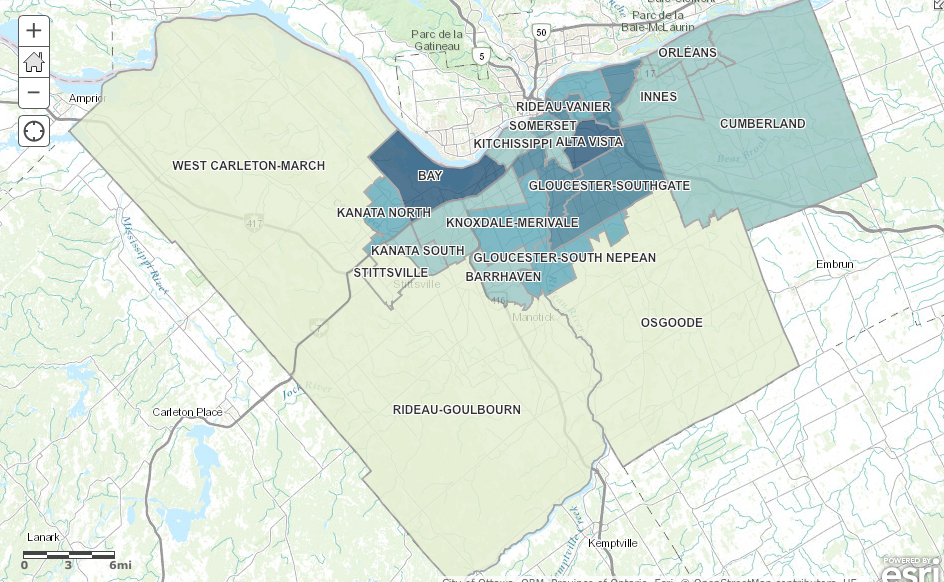By Nicole Rutherford
Moving to a different country can be life-saving, offering a fresh start for immigrants or refugees, but it can also erase a lifetime of work.
Throughout Ottawa, it is evident from the analysis of Ottawa’s National Household Survey of 2011 that the wards with the most immigrants per capita are also the wards with the lowest incomes. While language and networking barriers play a big part in this, another factor is the stunted recognition of education and credentials from foreign countries.

This is what associate professor at Carleton University and previous advisor of refugee policies to the United Nations, James Milner, refers to as “The age-old adage of brain surgeons driving taxis.”
Foreign education regulations are a big debate in Canada, especially surrounding careers in the education and medical fields.
“This is the age-old adage of brain surgeons driving taxis.”
“For the last five, six years there’s been a real emphasis on what’s called the recognition of foreign credentials,” said Milner. “The challenge is how do you ensure that there are retraining opportunities or verification or certification opportunities where these individuals can practice these much-needed skills in Canada?”
In the immigration process, certain careers allow for applicants to enter an express entry pool—a procedure that tallies points based on education credentials in conjunction with an applicant’s age and marital status. This helps expedite the acceptance of some candidates, but deters others if they don’t have experience in specific fields.

Click here to see an interactive version of this infographic
Another hurdle is coming into a new country without any professional networks. This is where Jasmine Qi, the project coordinator of the Ottawa Connector Program at Ottawa Community Immigrant Services Organization (OCISO) comes into play.
“We match newcomers with local employers based on experience and expertise,” Said Qi. “They meet one time for an information meeting, and then these local professionals will provide three additional references to the newcomer. This continues and helps newcomers build a new network.”
While the Connector Program does not focus on candidates being hired, Qi believes that the project’s initiatives are just as important.
“For us, we just want to try our best to help newcomers, because we know they are struggling from a lack of network and information.” said Qi, noting that the most common network seekers are foreign engineers.
Mohammad Shaa, a former dental technician, embodies these career challenges. He ran his own laboratory in his hometown of Homs, Syria, before the war broke out.
“I was one of the best,” said Shaa with a proud grin over a Skype conversation.
Shaa even moved and opened a second successful, but short-lived, laboratory in Damascus when things got too violent in Homs. The violence followed him.
“I had a good life. A great life,” Shaa said. “If I wanted something, I’d buy it. If I wanted a vacation I’d go. Now it’s all changed.”
Shaa, whose name has been changed for fear of threats to his relatives in Syria, escaped to the Netherlands after hiring a smuggler in Egypt. Now settled in the Netherlands, his degree, luckily, still counts—but he must learn Dutch before he can practice. He then must upgrade his education to a higher level so he can compete with Dutch contenders.
“I had a good life. A great life. If I wanted something, I’d buy it. If I wanted a vacation I’d go. Now it’s all changed.”
“I need to get a diploma in my field in the Netherlands,” said Shaa. “Otherwise I won’t find a job in my field. You can find a job as a cleaner or a cashier, but I don’t have any experience in this kind of job. I want to do my job, this is what I’m good at.”
While centres exist throughout Ottawa for immigrant integration, recognizing that immigrants and refugees are new Canadians and not simply a low-class workforce is something the new Liberal government will have to struggle with.
“Being able to engage with these kinds of programs would be one of the ways that Canada, to be frank, could derive the greatest benefit of resettlement programs,” said Milner. “[This way] the individuals who are resettled in Canada are able to more fully contribute to the needs of Canada once they’re here.”
